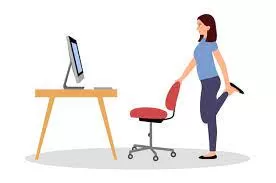Published November 5, 2024
A new study from the University of Colorado Boulder warns that sitting for more than 8.5 hours per day could accelerate aging and increase health risks, regardless of moderate exercise routines. Amid rising concerns that “sitting is the new smoking,” the research highlights that prolonged inactivity—whether at work, home, or while commuting—can significantly impact one’s health, making young adults appear older and heightening their risk for cardiovascular and metabolic diseases.
The study, published in PLOS One, involved more than 1,000 participants, with an average age of 33, including 730 twins, to analyze how extended periods of sitting affect cholesterol levels and body mass index (BMI). On average, participants reported sitting for nine hours daily while managing between 80 to 160 minutes of moderate physical activity.
According to Chandra Reynolds, Professor in the Department of Psychology and Neuroscience at the University of Colorado Boulder, “sitting less throughout the day, getting more vigorous exercise, or a combination of both may be necessary to reduce the risk of premature aging in early adulthood.” Reynolds noted that even younger individuals are not immune to the detrimental effects of a sedentary lifestyle.
The study’s findings revealed that even young adults adhering to the recommended 20 minutes of moderate exercise per day, like walking, may not be sufficiently protected against these risks. Instead, researchers suggest incorporating at least 30 minutes of vigorous activity—such as running or cycling—daily to partially counteract the effects of prolonged sitting. Participants who engaged in vigorous exercise showed cholesterol and BMI profiles akin to those of individuals 5 to 10 years younger. Yet, the researchers emphasized that even vigorous activity does not completely mitigate the risks.
Reynolds warned that “taking a quick walk after work may not be enough,” stressing that signs of health deterioration are already visible in early adulthood for those with sedentary lifestyles.
For those bound to desk jobs or long commutes, the study suggests several ways to reduce sitting time: using standing desks, taking regular breaks, and organizing walking meetings. These small adjustments may collectively help lower health risks associated with prolonged sitting.
As modern lifestyles continue to promote more sedentary work environments, this study reinforces the need for both lifestyle adjustments and exercise routines that go beyond current activity guidelines to counteract the health risks associated with extensive sitting.











